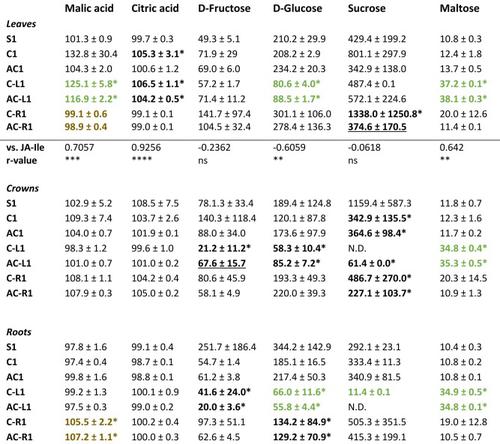当前位置:
X-MOL 学术
›
Environ. Exp. Bot.
›
论文详情
Our official English website, www.x-mol.net, welcomes your feedback! (Note: you will need to create a separate account there.)
Hormonal responses of rice to organ-targeted cold stress
Environmental and Experimental Botany ( IF 5.7 ) Pub Date : 2024-03-16 , DOI: 10.1016/j.envexpbot.2024.105739 Jana Jarošová , Sylva Prerostova , Martin Černý , Petre Dobrev , Alena Gaudinova , Vojtech Knirsch , Eva Kobzová , Karel Müller , Roman Fiala , Kinga Benczúr , Gabriella Szalai , Jan Novák , Břetislav Brzobohatý , Ondrej Novak , Radomira Vankova
Environmental and Experimental Botany ( IF 5.7 ) Pub Date : 2024-03-16 , DOI: 10.1016/j.envexpbot.2024.105739 Jana Jarošová , Sylva Prerostova , Martin Černý , Petre Dobrev , Alena Gaudinova , Vojtech Knirsch , Eva Kobzová , Karel Müller , Roman Fiala , Kinga Benczúr , Gabriella Szalai , Jan Novák , Břetislav Brzobohatý , Ondrej Novak , Radomira Vankova

|
Rice is a plant species sensitive to cold stress, which renders seriously its cultivation. Responses to cold stress (5°C, 24 hours) in whole plants, or targeted to rice leaves or roots were followed at the hormonome, transcriptome, proteome, and sugar levels, to find organ-specific responses and processes affected by cold acclimation. Targeted stresses caused proteomic changes mainly in the unexposed organs. An increase in abscisic acid (ABA) was accompanied by a decrease in jasmonic acid (JA) (in roots and non-stressed leaves) and (JA increased in stressed leaves). Both hormones promote the cold tolerance of plants. In this way, JA could indirectly reduce negative effects of cold on photosynthesis in leaves, while ABA dominates in roots (stimulation of protective substances, especially dehydrins, control of water regime). The decrease in cytokinins zeatin and dihydrozeatin in crowns correlated with stress-induced growth suppression.
中文翻译:

水稻对器官定向冷应激的激素反应
水稻是一种对冷胁迫敏感的植物,其栽培受到严重影响。在激素组、转录组、蛋白质组和糖水平上跟踪整个植物或针对水稻叶或根对冷胁迫(5°C,24小时)的反应,以发现受冷驯化影响的器官特异性反应和过程。定向应激主要在未暴露的器官中引起蛋白质组变化。脱落酸 (ABA) 的增加伴随着茉莉酸 (JA) 的减少(在根和非胁迫叶子中)和(JA 在胁迫叶子中增加)。这两种激素都能促进植物的耐寒性。通过这种方式,JA 可以间接减少寒冷对叶片光合作用的负面影响,而 ABA 在根部起主导作用(刺激保护物质,特别是脱水素,控制水分状况)。牙冠中细胞分裂素玉米素和二氢玉米素的减少与应激诱导的生长抑制相关。
更新日期:2024-03-16
中文翻译:

水稻对器官定向冷应激的激素反应
水稻是一种对冷胁迫敏感的植物,其栽培受到严重影响。在激素组、转录组、蛋白质组和糖水平上跟踪整个植物或针对水稻叶或根对冷胁迫(5°C,24小时)的反应,以发现受冷驯化影响的器官特异性反应和过程。定向应激主要在未暴露的器官中引起蛋白质组变化。脱落酸 (ABA) 的增加伴随着茉莉酸 (JA) 的减少(在根和非胁迫叶子中)和(JA 在胁迫叶子中增加)。这两种激素都能促进植物的耐寒性。通过这种方式,JA 可以间接减少寒冷对叶片光合作用的负面影响,而 ABA 在根部起主导作用(刺激保护物质,特别是脱水素,控制水分状况)。牙冠中细胞分裂素玉米素和二氢玉米素的减少与应激诱导的生长抑制相关。



























 京公网安备 11010802027423号
京公网安备 11010802027423号